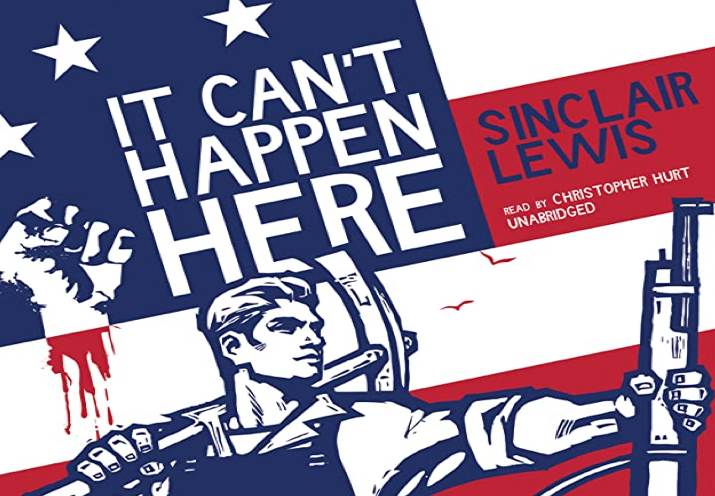CommentsVOICES-When Donald Trump was elected President in 2016, many people predicted that he would usher in a fascist government in the United States, an updated version of the fascist regime Sinclair Lewis imagined 86 years ago in “It Can’t Happen Here.”
Now, 3½ years into Trump’s first term, we still have elected representatives in Congress, 50 state capitals, 3,000 counties, 20,000 cities, and 14,000 public school districts. Newspapers, TV, radio stations, and online video and text websites still openly distribute a wide range of news and opinion ranging from the far right to the far left. Labor unions, though small and defanged, have not been shut down, and protests, such as those from the Tenants Union, continue with little governmental harassment. Wildcat strikes by teachers in many states were met with raises, not gunfire. Police officers still murder black and brown civilians but have not resorted to live fire against people attending political rallies and protests, like the Ohio National Guard did at Kent State and the local police did at Mississippi’s Jackson State in 1970.
Could this change?
What are the chances that a second Trump Administration will dissolve Congress, state legislatures, and city councils? Will Trump II rule by decree, shut down the media, cancel elections, lock up his critics in concentration camps, order the military and local police to take direct control of society, and violently quash unions and strikes? This might seem unlikely, but many people are convinced that the one thing standing between the continuation of this country’s anemic democracy and a fascist coup, perhaps shielded by gun-toting vigilantes, is the defeat of Donald Trump in November’s presidential election.
On one hand, American history, past and present, offers a long list of fascistic precedents that indicate how bad things could become. This includes genocide against Native Americans, slavery, concentration camps, lynchings, waves of anti-immigrant nativism, white supremacist Jim Crow laws and extrajudicial death squads like the KKK, mass surveillance, police spying and repression of the civil-rights and anti-war movements, political witch hunts, and violent suppression of labor actions. Furthermore, the U.S. government has and continues to support oppressive and racist dictatorships across the entire world through diplomacy, military aid, surrogates, and periodic invasions.
Like nearly all other countries, the United States also has millions of citizens who accept some fascistic practices as “normal.” At American workplaces, bosses (the idiomatic translation of Führer) have total control, without any democratic rights for employees, such as freedom of expression and association. If you criticize the boss, such as Amazon workers have recently done, you can be fired on the spot.
But, on the other hand, the U.S. does not currently have mass movements or political organizations that could effectively challenge the status quo. Trump has pleased his mega-donors and advisors with highly lucrative tax cuts that have only met token opposition. Plus, the Covid-19 Pandemic has given the Trump Administration and Congress another opportunity to fine-tune the responses of the Bush and Obama administrations to the Great Recession. Now, like then, government policy is further enabling the growth of the ultra rich at the expense of small investors, homeowners, renters, employees, freelancers, temps, and part-timers.
Could this change?
Could the eventual financial fallout of the pandemic lead to levels of unemployment, disease, poverty, and homelessness not seen since the Great Depression? Absolutely. Could these changes spark a revival of Occupy or new movements that would move from encampments to aggressive organizing, such as widespread rent strikes and workplace actions that could disrupt the economy and withstand lockouts and police attacks? Could these movements replicate the anti-war movement of the Vietnam War era that gained the wide support from soldiers and sailors, some of whom “fragged” officers and sabotaged war ships?
It is now hard to imagine, but it is certainly possible if these dire conditions emerged -- not just the reelection of a buffoon whose major achievement has been to shower his wealthy supporters with all the treats they could wish for -- American fascism could be the response. The United States came close to this during WWI, when any criticism of the war or the draft became a felony and the Woodrow Wilson administration jailed or deported thousand of political opponents.
Such a perfect storm is imaginable, but so is widespread opposition to any Presidential decrees to dissolve Congress, state legislatures, and city councils. Jailing union leaders has not stopped strikes, nor did throwing dissident soldiers into the brig restore military morale during the Vietnam War.
This history is there for all those who seek it out. That includes members of the one percent and their retainers, who might be reluctant to unleash something that could boomerang on them. It also includes those willing to resist a megalomaniac and his inner circle if they attempted to impose a dictatorship on American society.
(Victor Rothman is a California-based policy analyst. He can be reached at [email protected].) Prepped for CityWatch by Linda Abrams.
















